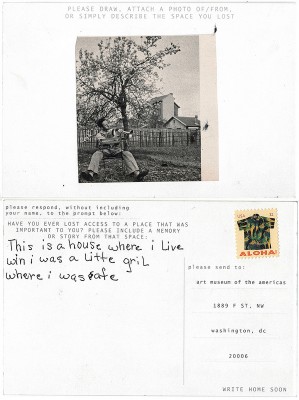In high school, Mark Strandquist spent hours working with social justice groups in D.C., listening to first hand accounts of segregation, unequal schools and housing and the crack epidemic from senior citizens.
Strandquist was amazed to realize that after a lifetime of hardship, many of these men and women were still suffering, struggling against gentrification to retain their homes and communities.
The experience stuck with him and has inspired his latest art project, called “Write Home Soon.”
Strandquist, a Mason alumnus and former student media photographer, is asking for the community to create postcards that share a memory or story from a lost space that was once, or still is, important to them.
“The main goal is to democratize the creation, exhibition, and consumption of art,” Strandquist said. “To help and foster a space where any individual, regardless of class, identity, or what side of the Anacostia River they live on, can include their voice, vision and memories near the National Mall.”
After spending so much time learning the stories of the senior citizens in D.C., Strandquist wondered what happens when individual histories are not recorded.
“What I’m interested in is questioning how our libraries, museums and textbooks would differ if they reflected the visions and memories of our local populations,” Strandquist said. “What interactions, challenging discourse and participation would these transformed spaces foster and allow?”
The project will be showcased at the Art Museum of the Americas in D.C. from Oct. 25 through the middle of January as part of the 2012-2013 exhibit “Ripple Effect.” The exhibit aims to make visitors direct participants in addressing pressing social issues by blurring the boundary between artistic practice and social engagement.
“Individuals can touch and transform the installation,” Strandquist said. “They can pick up a postcard and tangibly connect to these memories from all over the D.C. metro area. I think so many problems in our society exist because we’re alienated from each other. This is a very small step towards combating that.”
He touts the importance of the anonymity the postcards offer, which gives participants a chance to safely open up about their feelings and thoughts.
“You look at a card and you can think, ‘This could be my mom, my partner, a friend from second grade,’ it’s really important for the project to allow space for these associations,” Strandquist said. “The creation of the work is participatory, but so is the exhibition. By picking up a postcard you participate in the creation of the meaning, you tangibly connect to these memories and personal truths.”
The project is open for mailed-in submissions, but Strandquist has also been touring the area holding workshops where participants can create postcards.
After spending years behind the camera as a photographer and filmmaker, Strandquist has found the “Write Home Soon” project a humbling experience.
“So many amazing individuals, groups and organizations have opened up to share their memories or confront their pasts,” Strandquist said. “A woman gave me a hug the other day because the postcard gave her a chance for the first time to discuss her father’s loss of memory, his inability to recognize her and his death. She was crying – it was such a rare, raw and human moment.”
He has visited nearly 60 locations, including prisons, shelters, libraries, recovery clinics, universities and art centers, in hopes of reaching a cross-section of the D.C. metro area.
Strandquist still has not decided what his postcard will feature, but not for lack of personal experience with lost location.
“I moved 9 times in my first 11 years, spent two and a half years house-less traveling around the country hitchhiking and hopping freight trains,” Strandquist said. “There have been a lot of environments physical, natural and metaphysical, senses of home, family, love, safety and country, that I have lost, transformed, or moved beyond. But we all do. The hope is that this project is something that we can all simultaneously relate to and be challenged by.”







Comments